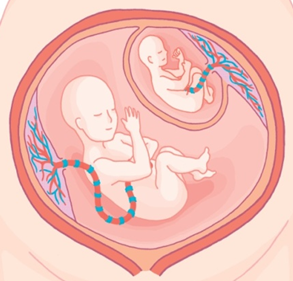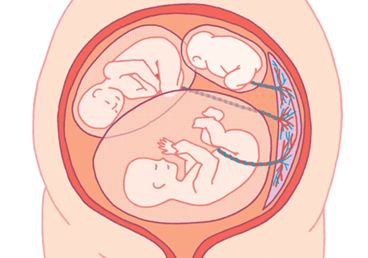Professor Asma Khalil, RCOG Vice President, shares her highlights from the important research on multiple pregnancies presented at this year’s World Congress.
Research is an integral part of my everyday practice, whether conducting studies, publishing research papers, reviewing studies for publication, collaborating with colleagues at my workplace or globally in large research trials. It this blog, I am sharing some of the highlights from studies presented at the RCOG World Congress.
Perinatal outcomes of dichorionic-diamniotic twin pregnancies complicated by fetal growth restriction
About two thirds of twin pregnancies are dichorionic. This means that there are two separate pregnancy sacs containing their own separate placenta and amniotic fluid.
Our research indicated that dichorionic twin pregnancies complicated by selective fetal growth restriction had five times higher chance of perinatal loss and three times higher risk of neonatal morbidity, compared to those pregnancies with normally grown twins. The findings are pertinent in the counselling and management of complicated twin pregnancies, where twin-specific outcome data should be used, rather than singletons data.

Neurodevelopmental Outcomes in Complicated Twin Pregnancies
In this contemporary cohort study, we report on children’s long-term neurodevelopmental outcomes, comparing these for complicated monochorionic diamniotic (MCDA) twin pregnancies compared to uncomplicated twin pregnancies. MCDA twins are identical twins who share a placenta but each have their own inner sac (diamiontic). This type of pregnancy accounts for approximately 20% of all twins.
Our study provides evidence that children born from complicated monochorionic twin pregnancies have a high rate of adverse neurodevelopmental outcomes (14.5%) compared to uncomplicated twin pregnancies (7.6%). Complicated MCDA twin pregnancies that underwent prenatal intervention had significantly higher rates of adverse neurodevelopmental outcomes compared to those that did not (28.1% versus 1.7%). Our findings reiterate the importance of long-term neurodevelopment follow-up of these children to ensure timely optimal therapy can be initiated for those affected.

Perinatal outcomes of monochorionic triplet pregnancies
This type of pregnancy is exceedingly rare and occurs when a triplet pregnancy shares one placenta. As this type of triplet pregnancy sharing one placenta is very rare, there are no useful data in the literature that could be used in counselling parents or managing these pregnancies. Collaborating with more than 20 fetal medicine centres globally, we present the largest cohort of these multiple pregnancies, their management, and outcomes.
The majority (90%) were managed expectantly. The incidence of fetal abnormalities was 14%. We noticed that twin-to-twin transfusion syndrome (TTTS) complicated 28% of the pregnancies, followed by selective fetal growth restriction (sFGR) (16%), while twin anemia polycythemia sequence (TAPS) occurred in only 3%. No antenatal complication was recorded in 49% of pregnancies. The rate of preterm birth prior to 28 weeks was 15% and prior to 32 weeks was 49%.

Machine learning technology to predict gestational diabetes and hypertension in twin pregnancies
Using Centers for Disease control and prevention (CDC) birth data from 17,972,300 singleton and 597,651 twin pregnancies, we developed a prediction model using machine learning (a form of AI) to assess the individualised (specific to each individual) risk of developing hypertension in twin pregnancies.
We identified that being younger than 20 years and older than 35 years, diabetes in pregnancy, Black ethnicity, overweight and obesity, excessive weight gain during pregnancy, IVF, and cigarette smoking prior to pregnancy increased the chance of developing hypertension in individuals with twin pregnancy. In fact, diabetes prior to pregnancy, obesity and excessive weight gain during pregnancy doubled the chance of developing hypertension in twin pregnancies. Even when you considered all these factors, being pregnant with twins doubled the chance of developing hypertension in pregnancy compared to singletons.
We also used the same technique and CDC birth data from 18,173,365 singleton and 611,043 twin pregnancies to develop a prediction model to assess the individualised risk of developing diabetes in twin pregnancies. We identified that being older than 30 years, being pregnant for the first time, IVF, hypertension prior to pregnancy, Asian ethnicity, overweight and obesity increased the chance of developing diabetes in individuals with twin pregnancy.
We developed two prediction models (one for hypertension and the other for diabetes) which include the relevant important information to provide an individualised to assess the chance of developing hypertension or diabetes in a twin pregnancy. This means that we can provide useful information for counselling regarding the chance of developing these disorders and tailor the care of the pregnancy, whether closer monitoring or recommending a preventative drug such as aspirin, according to the level of this risk.
